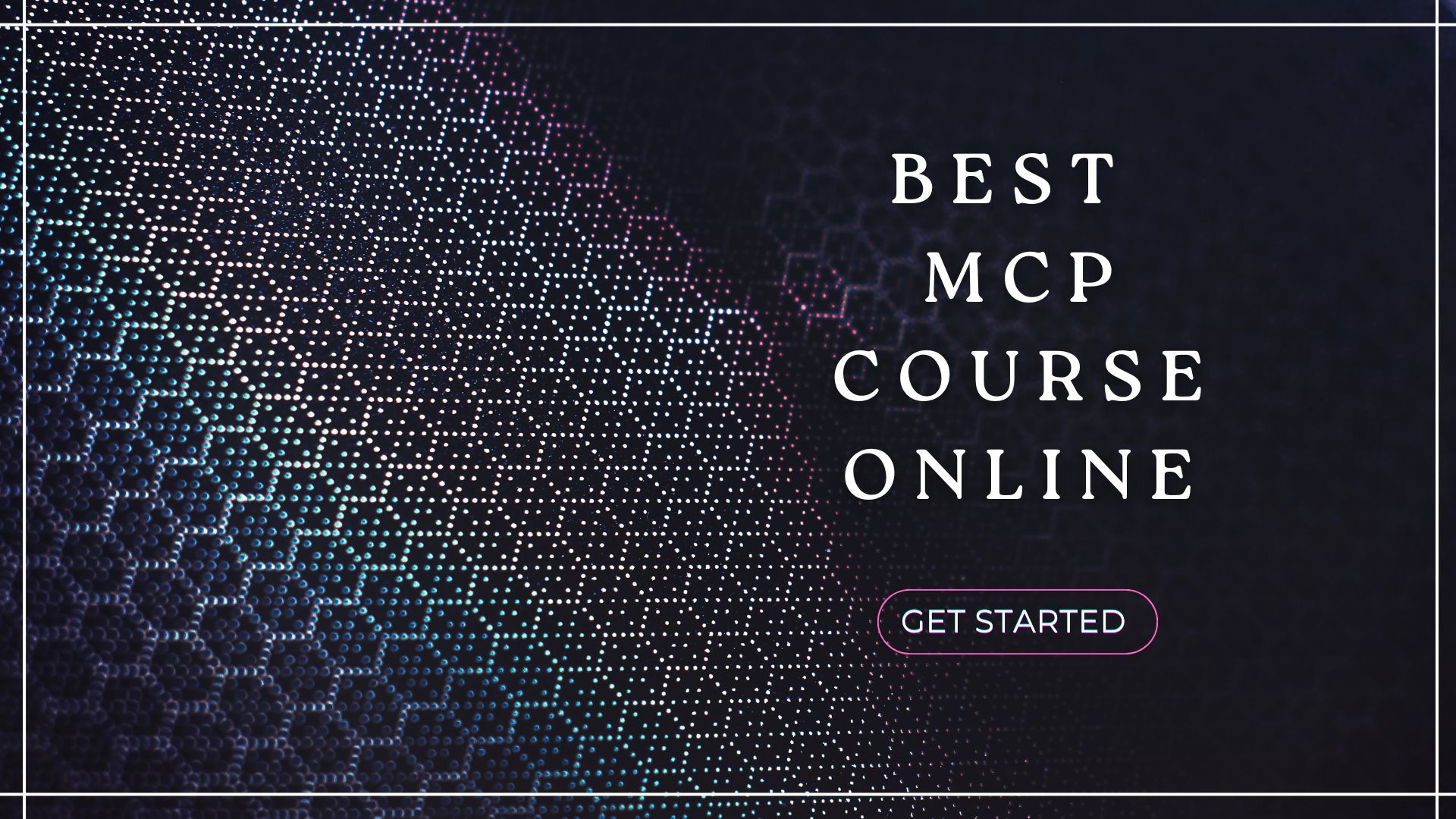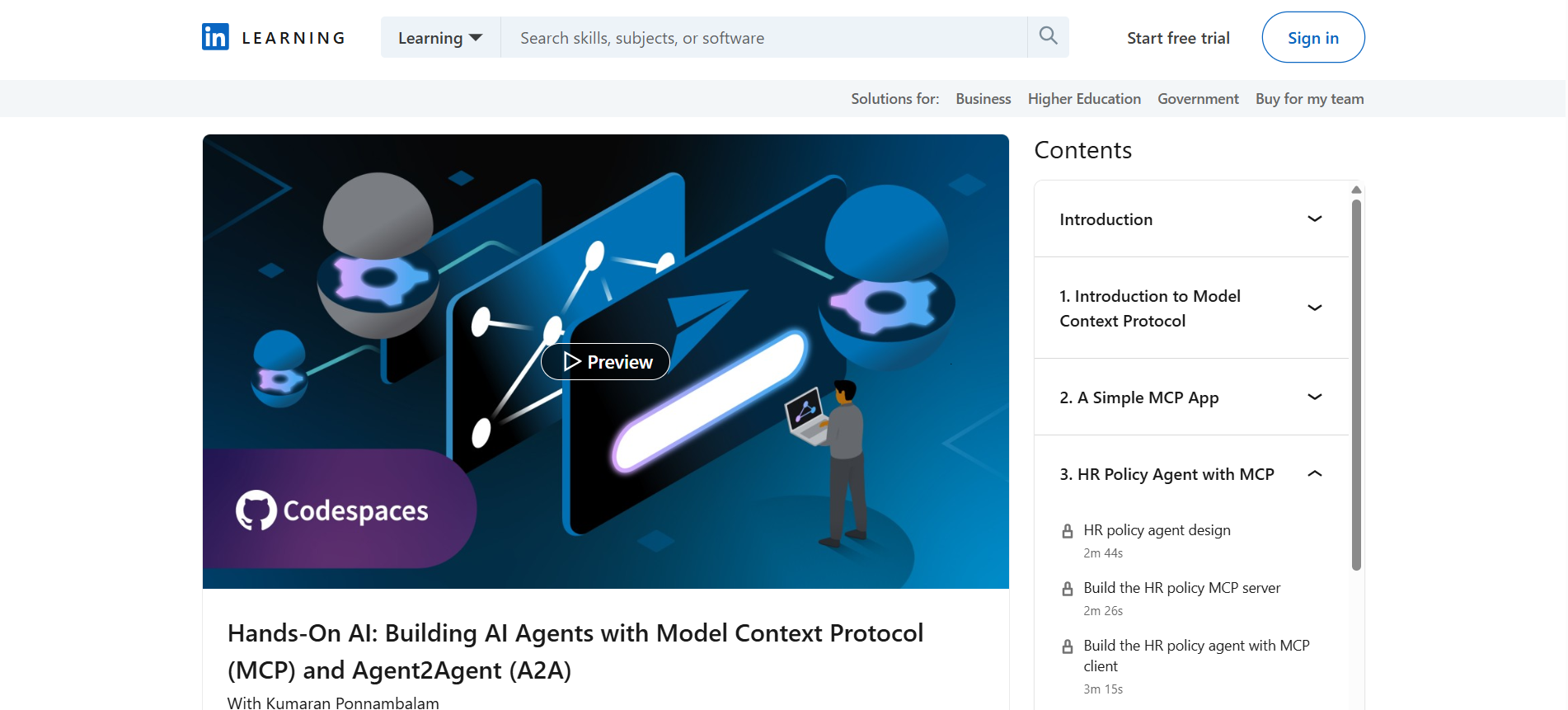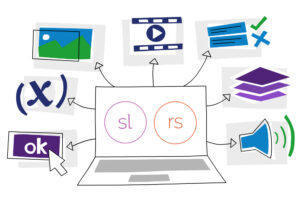
Mastering MCP with the 5 Best Courses in 2025

Understanding the Model Context Protocol (MCP) is important if you want to actively design the future of intelligent, autonomous systems rather than just experience it. AI is currently developing into dynamic, interactive structures that can really interact with the world, use tools and make decisions. Technologies like MCP, which act as the fundamental language for these intelligent things to interact and function as a unit, are primarily responsible for this significant change.
Building advanced AI agents that can automate difficult activities, provide intelligent support or even manage entire organizations without continuous human supervision is becoming a valuable skill as the field of AI develops. MCP greatly reduces the obstacles of creating genuinely autonomous and robust AI systems by standardizing the information sharing and interaction between Large Language Models (LLMs) and external functions.
However, entering this advanced field might be intimidating, with new resources and shifting best practices. This article will be your ultimate guide to the top Model Context Protocol (MCP) courses available in 2025. We will look at what each course offers, how it can directly improve your job or projects and helps you choose the best fit for your learning style and professional goals.
Top MCP course for Beginners
1. MCP Bootcamp: Build AI Agents with Model Context Protocol
This course offers a thorough practical learning experience focused on developing AI agents with the Model Context Protocol. You will create MCP servers and clients, integrate numerous tools and even deploy your AI agent apps. The course focuses on practical projects, ensuring that you not only understand the basic theory but also have the confidence to apply MCP in actual situations. It discusses the fundamental components of MCP, their relationships and how to properly manage context in agentic workflows.
Why This Course Stands Out:
- Designed to provide a rapid, yet thorough, understanding and practical application of MCP.
- Focuses heavily on building real AI agents and applications, moving beyond just theory.
- Clearly breaks down servers, clients, tools, resources and deployment within the MCP framework.
- Guides you through important aspects like deploying and publishing MCP components for functional systems.
Best For:
- Developers and engineers who want to build advanced AI agents.
- Individuals seeking practical, hands-on experience with MCP implementation.
- Those looking to standardize tool interaction for their LLMs.
- Learners who prefer a concise, bootcamp-style learning approach.
Platform: Udemy
Instructor: Eden Marco
Rating: 4.6 out of 5.0
Duration: 6hr 53min
Certification: Certificate of completion
2. The MCP Course You Need
This YouTube course focuses into the specifics of the Model Context Protocol (MCP) and its practical implementation through mcp.run. It highlights how MCP allows Large Language Models (LLMs) to extend their static knowledge and interact with real-world services, perform actions like web searches and even control cloud-native systems. This course emphasizes on structured communication using JSON, automation skills and the security benefits of Web Assembly for running tools. It also touches upon centralized tool management and multi-model LLM support within the mcp.run ecosystem.
Why This Course Stands Out:
- Provides specific insights into a prominent implementation of the MCP, including its unique features.
- Explicitly discusses the advantages of MCP in enhancing LLM capabilities and enabling automation.
- Highlights the use of Web Assembly for sandboxing and fine-grained access control, a crucial topic.
- Shows how mcp . run supports various LLMs, including multi-modal ones like Gemini.
Best For:
- Developers interested in the practical implementation of MCP.
- Learners seeking detailed explanations of mcp.run features.
- Those concerned with security and deployment aspects of AI agents.
- Individuals who prefer video-based learning for technical topics.
Platform: YouTube
Duration: 1hr 59min
Level: Intermediate to advanced professional
3. Full Course (Lessons 1-11) MCP for Beginners
This course offers a solid foundation in the Model Context Protocol (MCP) for beginners. It guides you through the process of creating and testing your own MCP servers and connecting clients, both with and without Large Language Models (LLMs). You will study fundamental features including content streaming, cloud deployment of MCP projects and working with official SDKs in C#, Java, TypeScript, JavaScript and Python. The course goes deeper into the core components of any MCP server tools, prompts and resources, and highlights MCP’s integration within the Microsoft ecosystem, demonstrating how it works with Azure, Azure DevOps and GitHub Copilot for enterprise-grade AI solutions.
Why This Course Stands Out:
- Explicitly designed for beginners, making complex MCP concepts accessible.
- Provides practical examples and SDKs across several popular programming languages (C#, Java, TypeScript, JavaScript, Python).
- Demonstrates how MCP fits into real-world enterprise environments with Microsoft services.
- Addresses critical AI security challenges like prompt injection and offers defense mechanisms.
- Includes practical projects like building a calculator agent, weather server and GitHub clone server.
Best For:
- Beginners in AI and developers new to Model Context Protocol.
- Developers working with Microsoft technologies and Azure.
- Learners who prefer a structured, official introduction to a new protocol.
- Anyone interested in understanding the security implications of AI agent development.
Platform: YouTube
Duration: 50 min
Level: Beginner
4. Hands-On AI: Building AI Agents with Model Context Protocol (MCP) and Agent2Agent (A2A)
This course introduces you to the Model Context Protocol (MCP) and Agent2Agent (A2A) communication frameworks essential for designing context-aware, collaborative AI agents. You’ll explore MCP architectures and implementations and learn how to build AI applications and agents that leverage rich contextual understanding. Instructor Kumaran Ponnambalam also dives into A2A’s structure and workflow, helping you gain hands-on experience with multi-agent ecosystems for real-world scenarios.

Why This Course Stands Out:
- Dual Framework Focus: Uniquely covers both Model Context Protocol (MCP) and Agent2Agent (A2A) communication.
- Emphasis on Collaboration: Teaches you to build interconnected, collaborative AI agents.
- Hands-on Experience: The course provides practical knowledge for implementing and executing multi-agent systems.
- Focus on Context: Highlights the importance of rich contextual understanding for building truly intelligent agents.
Best For:
- Individuals interested in building collaborative and interconnected AI agents.
- Learners who want to understand multi-agent (A2A) communication frameworks.
- Professionals seeking hands-on experience with MCP frameworks.
- Anyone at a general skill level looking to design and implement intelligent AI agents.
Platform: LinkedIn Learning
Instructor: Kumaran Ponnambalam
Level: General Duration: 1h 40m
Certification: Certificate of Completion
5. AI Coding with Cursor: Revolutionize Your Coding Workflow with AI-Powered Tools
This course is designed to transform your coding workflow with AI-powered tools, with a particular emphasis on the Cursor AI code editor. You will learn how to master AI-assisted code editing and use AI as a powerful pair programmer to increase productivity. The program ranges from optimizing your workflow with Cursor’s codebase expertise to implementing best practices for balancing AI support with human creativity. It focuses on constructing full-stack SaaS applications (web and mobile) with AI, covering topics such as debugging AI-generated code, efficient prompting for full-stack development, and leveraging Git for collaborative projects. Also, the course now contains content on the Model Context Protocol (MCP), which demonstrates how MCP can streamline AI agent creation inside your coding environment.
Why This Course Stands Out:
- Workflow Transformation: Focuses on integrating AI directly into the developer’s daily coding workflow.
- Full-Stack Application: Covers both frontend and backend development with AI assistance.
- Practical Tool Focus: Teaches practical use of tools like Cursor, Claude, v0.dev and Vercel.
- Includes MCP in Context: Integrates MCP knowledge within the broader context of AI-assisted coding and agent building.
- Vibe Coding Approach: Promotes a modern coding paradigm where AI streamlines the development process.
Best For:
- Developers looking to integrate AI tools directly into their coding workflow.
- Full-stack developers aiming to leverage AI for faster development.
- Learners interested in building AI-assisted SaaS applications.
- Individuals curious about theVibe Coding paradigm and Cursor AI.
Platform: Udemy
Instructor: James Anthony Phoenix
Rating: 4.5 out of 5.0
Duration: 5hr
Level: All Skill Levels
Certification: Certificate of completion
Frequently Asked Questions (FAQs)
1. What exactly is Model Context Protocol (MCP)?
Model Context Protocol (MCP) is an evolving standard that defines a structured way for Large Language Models (LLMs) to communicate with external tools and services. It allows LLMs to use functionalities beyond their internal knowledge base, enabling them to perform real-world actions like searching the web, interacting with APIs or managing databases.
2. Why is learning MCP important for my career in 2025?
As AI moves towards more autonomous agents, MCP becomes a foundational skill. It allows you to build sophisticated AI systems that can independently perform complex tasks, automate workflows, and interact with diverse digital environments. Mastering MCP positions you at the forefront of AI agent development, a rapidly growing and high-demand field.
3. Do I need a strong programming background to take these courses?
For most of these courses, particularly those focusing on building agents or integrating tools, a good understanding of Python programming is highly recommended. For the “AI Coding with Cursor” course, while it claims to be for all levels, basic coding knowledge will significantly aid your learning.
4. What kind of AI agents can I build after learning MCP?
With MCP, you can build a wide variety of AI agents, including:
- Automated Research Agents: That can search the web, summarize findings, and compile reports.
- Intelligent Customer Service Bots: That can query databases, interact with CRM systems, and resolve customer issues.
- Workflow Automation Agents: That can connect different software services (e.g., send emails based on CRM updates).
- Data Analysis Agents: That can fetch data, perform analysis, and generate insights using external tools.
- Specialized AI Assistants: For tasks like financial analysis, content generation, or project management.
5. Are these courses suitable for non-developers or business professionals?
While the Model Context Protocol itself is quite technical, understanding its capabilities is crucial for non-developers too. Courses like “The MCP Course You Need” (Kubesimplify) offer good overviews. However, if your goal is primarily strategic understanding rather than hands-on building, you might want to complement these with more conceptual AI courses or focus on the overview sections provided.
6. What’s the difference between LangChain/CrewAI and MCP?
LangChain and CrewAI are frameworks that help you orchestrate LLMs and tools to build agents. MCP is a protocol that defines how these tools and contexts are formally communicated and shared. You can use LangChain/CrewAI with MCP to create highly standardized and interoperable agents. MCP provides the “rules” for communication, while frameworks provide the “structure” for building.
7. Is MCP an open-source standard?
Yes, Model Context Protocol is designed to be an open standard, fostering community contributions and widespread adoption for interoperable AI agents. This open nature promotes innovation and allows for greater flexibility in building AI solutions.
8. What are the key tools and technologies covered in these courses?
You can expect to encounter:
- LLMs: OpenAI (GPT models), Claude, Gemini.
- Programming Languages: Python, TypeScript/JavaScript.
- Frameworks: LangGraph, LangChain, Gradio.
- AI Code Editors: Cursor.
- Deployment Platforms: Hugging Face Hub, Vercel.
- Concepts: JSON, JSON Schema, Web Assembly, API integration, sandboxing.
Conclusion
Understanding the Model Context Protocol is your key to moving from passive AI user to active AI creator. By standardizing how AI agents communicate and interact with the world, MCP empowers you to build the next generation of autonomous systems that can truly innovate. The skills you gain from these courses are not just for today, but for a future where intelligent agents are a fundamental part of our digital ecosystem.
Hey! We hope you have found this guide to MCP courses helpful and intriguing. Since you’ve made it this far, then certainly you are willing to learn more, and here at Coursesity, we are to enlighten people with knowledge on topics they are willing to learn.
Here are some more topics that we think will be interesting for you!
Source link



